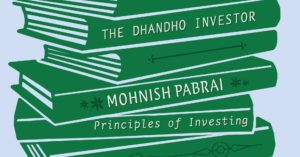Mohnish Pabrai is a famous value investor based in the United States. He is of Indian origin. When I started reading about investing, I came across his videos on youtube and they really opened up my mind for investing. He comes from an engineering background as well, so I could connect to him. His explanations are free of financial jargon and very easy to understand.

I have also read his book “The Dhandho investor” where he lays out a few core principles like “buying low, selling high”, “Heads I win, tails I don’t lose much”, running a business while keeping the operating costs at a minimum, buying out the bankrupt competitors who could not beat the price. In a subtle way, he also brought the financial benefits of the extended family system prevalent in India (though it is on a decline now).
He started out running a software consultancy and after coming across Warren Buffett and Charlie Munger, became a discipline of their investing style. He had capital that he had acquired by selling his company and used it to invest both in the USA and India. He was lucky as well riding on top of the dot com boom and had spectacular returns from his investments. That motivated him to start his own “Pabrai Funds” which he modeled on the initial Buffett partnership. He did some calculations and arrived at the his magic number of “COMPOUND 26”, to compound his capital at 26% annually, which is by no means an easy feat. He even has his car license plate reflecting his goal.
He had spectacular success with his fund. He attracted a niche client base who are very successful in their careers, either entrepreneurs or high income earners. He studied Buffett inside out and applied his investing principles. He bid a huge sum of money for a charity lunch with Buffett. It may seem that he has squandered this money but there are a lot of advantages he gained. First of course is the publicity that comes with it. The second is the satisfaction of supporting charitable work. The third and the most valuable, is the personal time with the king of investing and the nuggets for a lifetime.
He is very good at cloning. And he is very frank about it. “Do not reinvent the wheel” as they say. However human ego does not appreciate copying others in seeking its own identity. This is the reason many shy away from applying success principles. That gives Mohnish a huge advantage and he stays away from many of the pitfalls of investing. He had his share of failures too during the financial crisis of 2008 where one of his funds was down almost 70%. But that is part of the game. No one can have success in investing all the time. But what one learns from the failures is what sets one apart.
He also runs the “Dakshana Foundation” which is a charitable organization that selects intelligent kids from poor backgrounds and provides them with coaching to crack the coveted IIT (Indian Institute of Technology) entrance exam. The kids who have been through this are now working in top technology companies including Google. I’ve heard him say that this is his legacy and I am really amazed at his attitude of giving back to the society.
The following are the bedrock of his principles, that can be applied by any retail investor:
- Not taking management fees from his funds. It is kind of a 0-30 hedge fund – no management fees and 30% of the profits after a hurdle rate. This aligns the fund manager’s interests with the investor as the manager is always motivated to find winning investments, otherwise he has no incentives. In the 2-20 world of hedge funds, the managers get their pay no matter what the performance of the fund.
- Finding stocks that have a P/E of 1. Yes, you read it right! Most of these companies are down for a reason because they are staring at bankruptcy but once in a while, a gem comes up that allows Mohnish to hit his home run. “Few bets, big bets, infrequent bets” – that is the mantra for his success!
- Being a shameless cloner (this is phrased by Mohnish himself!) Cloning what works and avoid experimenting with money.
- Never short stocks. In one of his lectures at google, he told clearly that if there is just one thing that one can learn from him at that time, it is never to SHORT stocks. Also AVOID leverage. This is reflecting Charlie Munger’s famous saying “If I know where I will die, I will never go there!”
- Do NOT have an investment team. Investing is a single player sport. He takes investing as a leisurely sport, relaxed and calm and keeping emotions in check all the time.
- Avoid complicated investing situations. Keep spreadsheet software away and make investing decisions based on the back of the envelope calculations.
